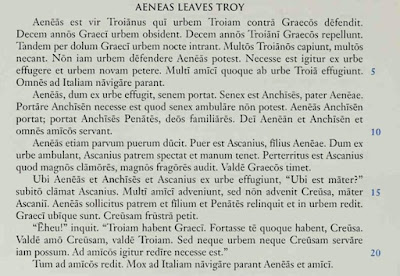These posts are for review; how these nouns decline i.e. the endings which they have, are all covered in earlier posts. This post shows how the nouns are divided into declensions, the term used in grammar to refer to which group a noun belongs, and depending on the group, the nouns will have a particular set of endings common to all of them.
A reminder that, in dictionaries and vocabulary lists, nouns are listed with [i] their nominative singular and [ii] their genitive singular; all the groups have a different genitive singular and so it is the genitive singular that will explicitly show what declension the noun belongs to, which is why it is crucial to learn Latin nouns with both pieces of information:
There are five declensions in Latin.
Note: the fifth
declension is not in the original text and so I have added a line
marked * so that it can be included.
Note: I have also included a
line marked ** which shows the use of the dative case which
did not appear in the previous text that covered all the other cases. That is
briefly discussed in the next post.
_____
[i] Creūsa, wife of Aeneas and mother of Ascanius
_____
[1] First declension: all
first declension nouns end in -a and almost all are feminine
Troia, -ae [1/f]: Troy
· Troia (nominative
singular), Troiae (genitive singular) [1/f] 1: first declension; f:
feminine
Ītalia, -ae [1/f]: Italy
[2] Second declension:
[i] almost all second
declension nouns end in either -us [masculine] or -um [neuter]
amīcus, -ī [2/m]: friend
- amīcus (nominative singular), amīcī (genitive singular) [2/m] 2: second declension; m: masculine
annus, -ī [2/m]: year
deus, -ī [2/m]: god
dolus, -ī [2/m]: trickery
fīlius, -ī [2/m]: son
Graecus, -ī [2/m]: (a) Greek
Troiānus, -ī [2/m]: (a)
Trojan
From the previous text:
baculum, -ī [2/n(euter)]:
stick
[ii] some end in –(e)r
vir, -ī [2/m]: man
- vir (nominative singular), virī (genitive singular) [2/m] 2: second declension; m: masculine
puer, -ī [2/m]: boy
[3] Third declension: the third declension was covered
extensively; it is different from all the other declensions because [i] the
nominative singular can have a variety of endings and [ii] the genitive case
ending very often involves a change of stem to which all the other case
endings are added:
clāmor, clāmōris
[3/m]: shout; cry
fragor, fragōris
[3/m]: uproar; din
māter, mātris [3/f]:
mother
nox, noctis [3/f]:
night
pater, patris [3/m]:
father
senex, senis [3 m/f]:
old man / woman
urbs, urbis [3/f]: city
The 3rd declension is a big area
of study and thousands of Latin words are in that declension.
[4] Fourth declension
manus, -ūs [4/f]:
hand
This one shows you precisely
why the genitive needs to be known:
[i] amīcus, -ī [2/m]:
friend; second declension │ [ii] manus, -ūs [4/f]: hand;
fourth declension
If you’re on “Who wants to be a Millionaire?” and you’re
asked which one it is, then go for second declension! There are thousands of
those and far fewer 4th declension ones. If you’re into facts and figures:
wiktionary lists in excess of 5,000 2nd declension nouns in -us, and about 600
4th declension nouns.
[5] Fifth declension
I have *added a sentence*
- diēs, -ēī [5 m/f]


No comments:
Post a Comment